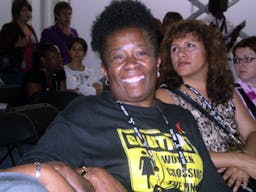Hope out of Despair - A Shining Light of Hope
Jan 21, 2015
Story
Interview by Martha
Tariro Chikwanha is a slim, tall, energetic lady exuding much maturity, and has a calming effect on those who happen to come her way. Tariro is Shona (one of Zimbabwe’s indigenous languages) for hope. It may be that Tariro’s parents knew she would be someone who would never let insurmountable odds get her down, and that she would lead and give hope to others. It may be very difficult to try to understand how Tariro can maintain a very positive attitude with what she has gone through in life, and the conditions under which she lives. I interviewed Tariro over the phone. I have known her for a few years as she is a well-known activist, and very popular community activist in Chitungwiza, a dormitory town about thirty (30) kilometres from Harare. Chitungwiza is an area that is well-known for the lack of basic services necessary for people’s basic comfort in their living conditions.
Tariro is a widow – her husband passed away nine years ago. She and her husband were diagnosed HIV-positive in 1997. By the time her husband died, there was still no medication for HIV, and Tariro was despondent as she expected to die a short while after her husband. However, she came across Utano Project as it was initiated in her community in 2003. Utano is a Shona word that means health. The project was formed with the aim of supporting people living with HIV (PLHIV) in the area with information on coping with the virus. As one of the first clients, Tariro soon organised other women clients of the project to form Utano support group. Tariro said this was due to the fact that as a result of high stigma and discrimination against PLHIV in her community at the time, there was no space for HIV-positive women to get together and discuss issues that concerned them specifically as women with HIV, and living in Chitungwiza.
Utano Support Group, under Tariro’s guidance, has since grown from a handful of women members to over one hundred (100) members today, including thirty-five men. The support group members over the years have received support from Utano Project in terms of various skills development. Now the support group has divided themselves into smaller groups in order to engage in entrepreneurial projects, with some making garlic soap, others make toilet liquid cleanser, while others make peanut butter. This has enabled the members of the support group to remain positive about their condition as they keep busy, earning their keep, and providing for their families. For Tariro, this has meant ability to raise and educate her four children, two of whom are now adults and employed.
Tariro has been pivotal in organising grassroots communities of PLHIV, not just in Chitungwiza, but nationwide, to claim and utilize space within the Zimbabwe Social Forum. Through her and the communities’ participation in the Social Forum space, Tariro and others in her community have learned and fully claim their rights to access to affordable healthcare. Tariro is now a point of consultation for advice in her community. As a community advocate, a note from her to the local hospital is accepted as a referral when a patient goes to the hospital. Tariro has recently registered a Community-Based non-governmental organization (NGO) she founded to provide support for orphans and other vulnerable people in Chitungwiza.
Tariro said the most dramatic thing that has happened to her because of her HIV-positive status and community activism is having travelled to six countries – Malawi, Zambia, Lesotho, Swaziland, Kenya and Brazil. She however lamented that they hear of big funds like the Global Fund to Fight AIDS, TB, and Malaria coming to Zimbabwe, but for her and others at the grassroots, the funds seem to end in the big NGOs in the big cities.




